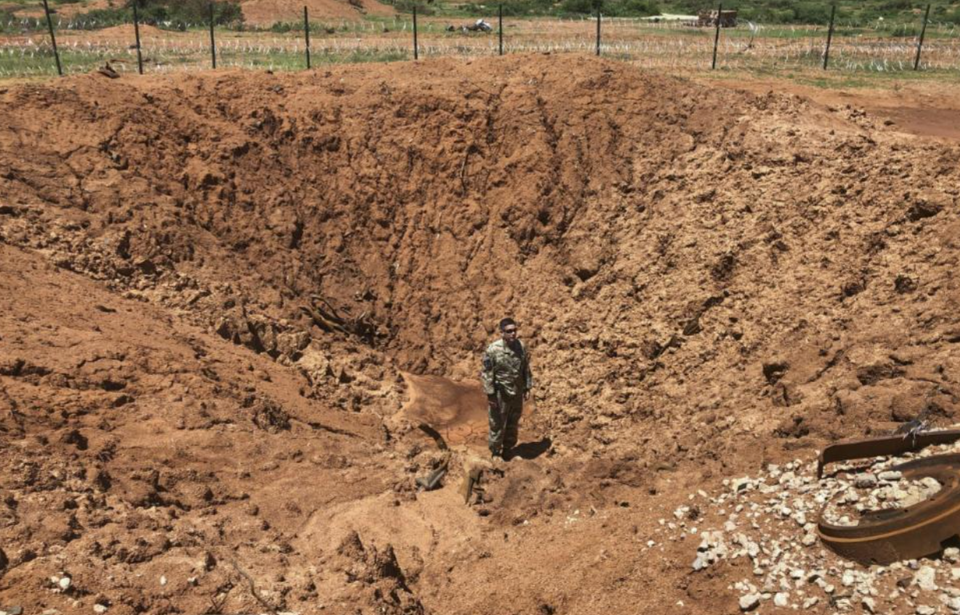In September 2019, members of the 102nd Cavalry Regiment from the New Jersey Army National Guard engaged a group of al-Shabaab militants who launched an attack on Baledogle Military Airfield. This battle marked the most significant confrontation between US forces and the Somali branch of al-Qaeda since Operation Gothic Serpent in 1993, and it was widely regarded as an outstanding demonstration of “discipline and bravery.”
History of Baledogle Military Airfield
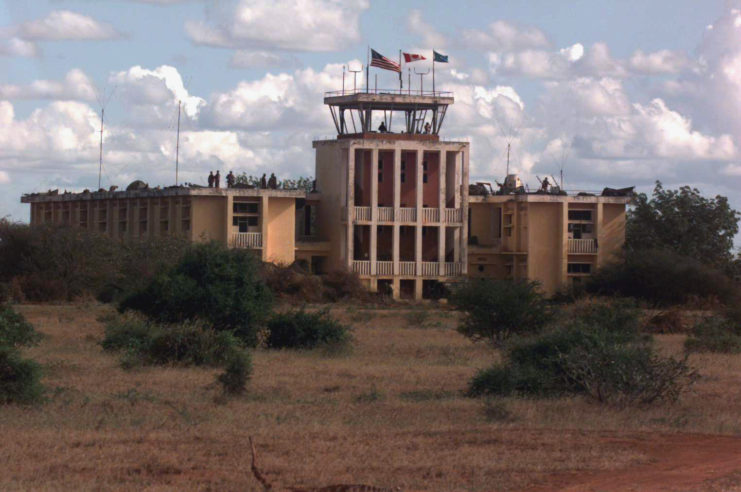
Situated 60 miles northwest of Mogadishu, in the Lower Shabelle region of Somalia, Baledogle Military Airfield was originally constructed in the 1970s by the Soviet Union. It was intended for the use of both Soviet soldiers and airmen from the Somali Air Force. From 1993-95, the base served as the home for members of the US 10th Mountain Division who were actively involved in UN Operations in Somalia II (UNOSOM II).
Since 2007, the United States has maintained a near-continuous presence in Somalia as part of the Global War on Terrorism. Baledogle stands out as one of the military’s most remote bases in the region, an is surrounded by ongoing enemy activities. In order to safeguard the airfield and the neighboring communities, a Special Operations Task Force, alongside private security contractors affiliated with Bancroft, are regularly stationed at the location.
The 102nd Cavalry Regiment was prepared for a potential attack
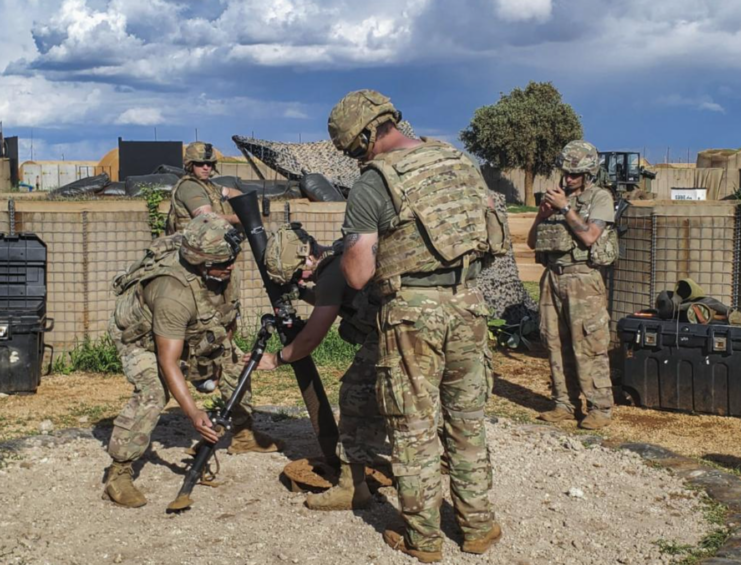
In 2019, members of Charlie Troop, 1st Squadron, 102nd Cavalry Regiment, part of the New Jersey Army National Guard’s Task Force Warrior, were deployed to Somalia. Along with aiding in the mission of the US forces already stationed in the country, they were tasked with supporting the Somali people.
Prior to their deployment, the 70-soldier troop was bolstered. Fire direction officers with the 3rd Battalion, 112th Field Artillery Regiment were added to the unit, as was a mortar platoon from the 2nd Battalion, 113th Infantry Regiment. When the 102nd arrived in Somalia, their numbers had more than doubled to 160 soldiers.
All along, those stationed at Baledogle were anticipating an attack by al-Shabaab – the question was when. Militants performed regular scouting missions to locate defensive positions and gain insight into how the Americans would react. To ensure little information was gleamed during these visits, the troops of the 102nd Cavalry were told not to engage.
To adequately prepare for an attack, those stationed at the base frequently rehearsed possible encounters, all of which used live fire. They worked long hours, went out on their own reconnaissance patrols and rotated those standing guard.
al-Shabaab militants launch their attack
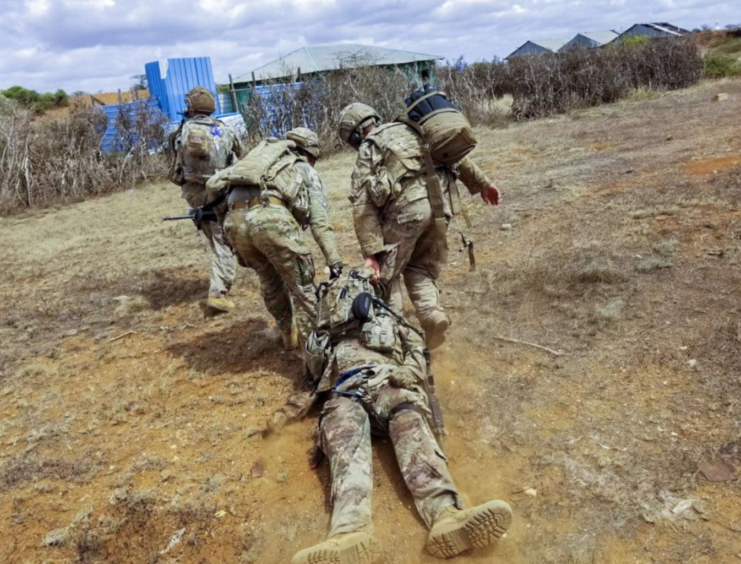
On September 30, 2019, members of the 102nd Cavalry were preparing a convoy to meet the chief of police and other leaders in a town 25 miles from Baledogle. At approximately 9:45 AM, they heard an explosion, which turned out to be the detonation of a vehicle-borne improvised explosive device (VBIED). The truck had been driving toward the airfield, but went off prematurely.
As the attack began, a UN aircraft was preparing to land and one manned by the US Air Force was about to take off. As well, 50 civilian construction workers were repairing the runway. The first course of action was to clear the area, so three soldiers were tasked with moving the civilians to safety, while the UN aircraft was diverted and the Air Force one told to immediately leave the area.
“I ran to the operations center and [Capt. London] Nagai was already maneuvering Charlie Troop toward the explosion site,” recalled Lt. Col. Richard Karcher, commander, Task Force Warrior. “He had the vehicles that were originally part of the convoy going to the airfield; he started moving additional personnel to the towers, which covered the approach to the airfield, and he closed all entry control points. Snipers were also posted base-wide.”
Members of the 102nd Cavalry ran to their positions both on the exterior of Baledogle and in the operations center, where they used cameras tethered to an aerostat to watch the base. As Nagai later explained, “The key was not engaging with the enemy until they were committed to utilizing a specific route that would ultimately be a fatal choice for them.”
They waited until the militants were right where they wanted them before launching their counteroffensive.
The then-largest VBIED used on the African continent
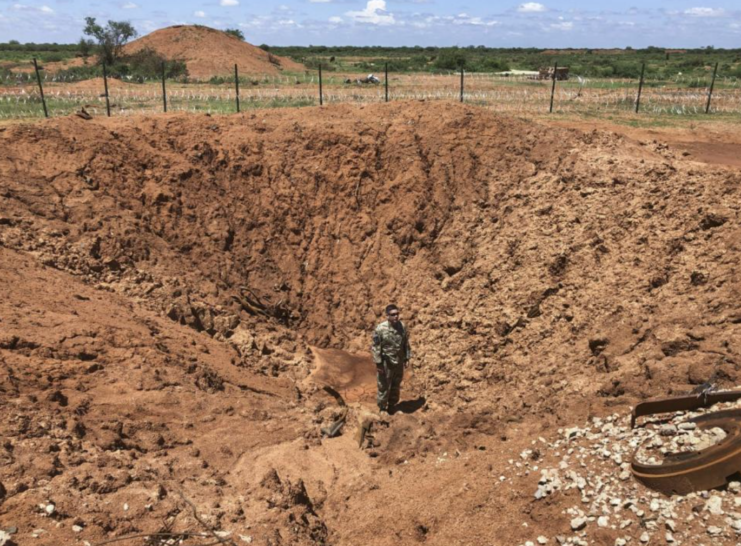
Ten minutes later, a second truck broke away from a convoy transporting construction material and drove toward the perimeter fence. While members of the 102nd Cavalry began firing at the vehicle, they were unable to cause much damage, as its windows were reinforced with armor.
Luckily, prior to the attack, an engineer platoon had dug a trench along the outside of Baledogle, with the intent of stopping any vehicle that was smaller than a tank – including the truck coming straight toward the airfield. It got stuck in the dugout, despite the driver’s attempts to reverse, allowing the 102nd to secure a fatal hit.
Five minutes later, the truck detonated with the force of between 4,000 and 5,000 pounds of explosives – at the time, the largest VBIED used on the African continent. Along with rocking the base, the blast blew a 200-yard-wide hole in the fence and created a crater that was 20 feet deep.
A third truck hides 12 armed militants
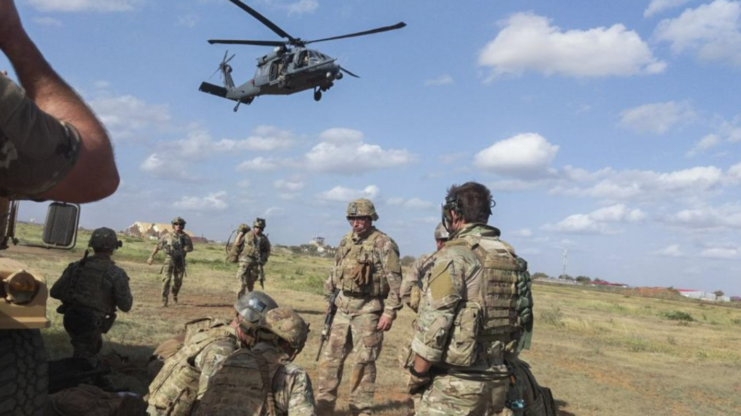
Approximately 10 minutes after the second truck exploded, a third one drove up to the hole in the fence line, stopping just before the large crater. It was then that the wind blew off the tarp covering the truck bed, revealing a dozen al-Shabaab militants who were equipped with PKM machine guns, hand grenades, assault rifles, RPG-7s and ammunition.
It appears the militants were hoping to be within the perimeter, not directly outside it, and struggled to organize themselves amid the chaos. Almost immediately, snipers Staff Sgt. Nicholas Swanson and Sgt. James O’Brien began shooting, killing half within a timespan of five minutes.
With the remainder of the militants seeking cover behind their truck, Capt. Nagai and Lt. Col. Karcher decided to activate their mortar team. While 60 mm, 81 mm and 121 mm weapons were fired, indirect and direct fire was also used against them.
It was over in less than an hour
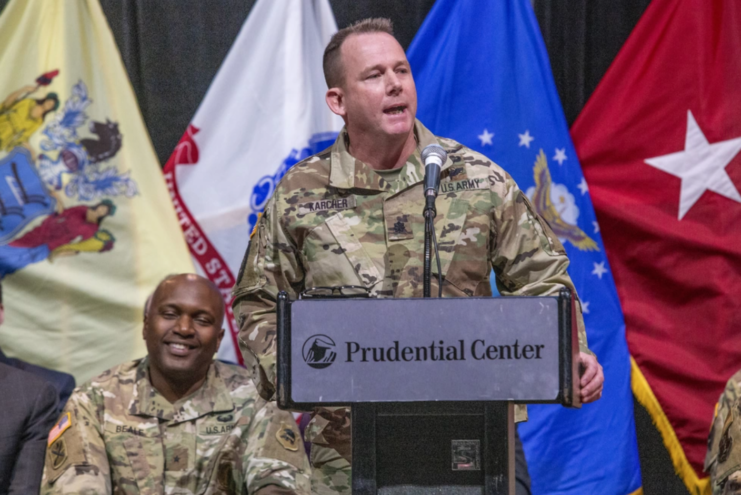
A ceasefire was later called, during which Lt. Col. Karcher’s team examined the third vehicle through the cameras set up around Baledogle. After consulting with a US Marine Corps unit assigned to the airfield, it was determined the truck was another VBIED, prompting the deployment of an Air Force drone to destroy it.
After less than an hour, the al-Shabaab militants had been completely wiped out. While the most recent press release states that none of the 102nd Cavalry’s members suffered injuries, a 2019 statement from US Africa Command (AFRICOM) did say a soldier suffered a concussion.
The engagement was the first time since the Second World War that a unit from New Jersey was involved in a combined arms battle, and it was the largest meeting between US forces and al-Shabaab since 1993’s Operation Gothic Serpent, which included the infamous Battle of Mogadishu. The latter was immortalized by 2001’s Black Hawk Down.
The day following the attack, al-Shabaab leadership published a letter and video online, claiming a decisive victory at Baledogle. This contradicted the real outcome, which saw the 102nd Cavalry secure a much-deserved win. However, as Karcher later said, “There is no question that if it hadn’t been for Charlie Troop, al-Shabaab would have destroyed the aircraft and killed as many people as possible.”
Militants opted to not launch any other attacks on Baledogle Military Airfield following the September assault. Seventy-six days later, on December 12, 2019, the 160 members of the 102nd Cavalry returned to the US.
The 102nd Cavalry Regiment are recognized for their actions
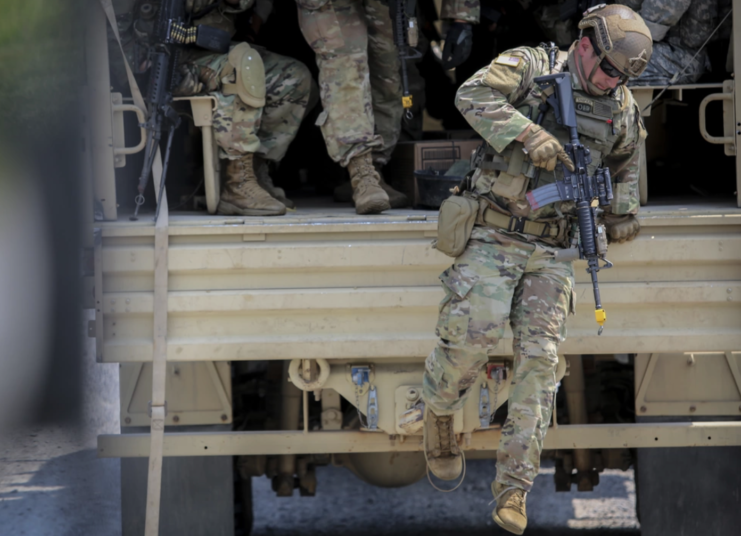
In the days following the engagement, members of the 102nd Cavalry were awarded the Combat Medical Badge, Combat Action Badge and Combat Infantry Badge, depending on their branch. Just under a year later, in August 2020, they received even more recognition at a ceremony at their home station in Westfield, New Jersey. During the ceremony, members were the recipients of Bronze Stars and Army Commendation Medals with Combat Device for their actions and bravery.
More from us: Operation Trent: The British Special Air Service’s Astonishing Daylight Mission in Afghanistan
Speaking about the bravery of those who fought the militants that day in September 2019, Capt. Nagai said, “The discipline and bravery of the Soldiers was something I will never be able to fully explain and something I am sure I will never see again.”
